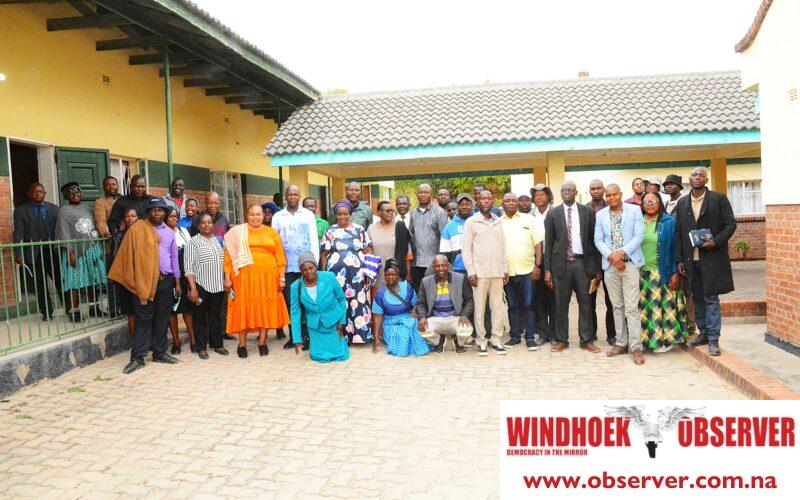Moses Magadza and Cleophas Gwakwara
Citizens of Murambinda, Zimbabwe, have urged Parliament to strengthen environmental accountability, decentralise climate governance, and ensure the fair distribution of climate funds as lawmakers continue nationwide consultations on the Climate Change Management Bill.
The Joint Portfolio Committee on Environment, Climate and Wildlife and the Thematic Committee on Climate Change on Wednesday held their second public hearing at the Better Schools Programme of Zimbabwe (BSPZ) Centre in Murambinda in Manicaland province.
The hearings are being conducted in line with Section 141 of the Constitution, which enjoins Parliament to consult citizens during law-making processes.
The consultations are supported by the Sweden-funded Sexual and Reproductive Health and Rights (SRHR) Project under the SADC Parliamentary Forum, which seeks to integrate gender, health and rights considerations into climate policies.
Chairperson Hon. Samson Matema led the proceedings as the Climate Change Management Bill was presented to an engaged audience. Among many other proposals, the bill includes carbon trading, emissions regulation, and the mainstreaming of climate action across all sectors and levels of government..
It also proposes to establish the Climate Change Management Department as the main body for implementing and coordinating national climate change policies. Overall, the bill aims to make climate action coordinated, inclusive and sustainable, laying a firm foundation for a low-carbon, climate-resilient Zimbabwe.
The SRHR Project has taken a proactive and pragmatic step towards climate action, recognising that climate change increasingly undermines maternal, newborn, and reproductive health outcomes due to extreme weather events like droughts, floods, and heatwaves that disrupt healthcare services and food security.
Yet issues of sexual and reproductive health rights (SRHR) and maternal, newborn, and child health (MNCH) remain largely unanchored in most climate laws across the SADC region. The SADC PF contends that embedding these priorities within legislation would ensure service continuity, rights protection and equitable access to climate finance for vulnerable populations. The expectation is that this integration will enable Zimbabwe to better link health, gender equity, and climate governance.
Opening the hearings, Hon. Matema said Parliament had travelled to the people to collect views that will shape the final bill.
“This is your Constitution and your Parliament,” he said, adding, “You are protected here just like MPs in Parliament. Feel free to express your views. Your contributions will be captured and presented in a report to Parliament before the bill becomes law.”
Residents welcomed the bill as “long overdue” but called for tougher provisions on enforcement and climate justice.
Local councillor Chamunorwa Mudzimu decried the severe environmental degradation caused by some mining operations in Buhera. He described a landscape where dust, noise pollution and contaminated water had destroyed some crops and endangered livelihoods.
He said penalties must be fair, equitable and sensitive to local realities, given that some communities suffer more than others.
He also demanded transparent distribution of climate and carbon funds, saying affected communities must directly benefit from penalties paid by polluters.
A similar call came from another participant who insisted that climate fines must not disappear into central accounts but reach communities suffering the consequences of pollution.
Residents urged legislators to promote research, local innovation and sustainable economic opportunities in the bill.
Rhodes Mutsigiri stressed that climate action must be backed by scientific research. He warned that without funding for research, lasting solutions would remain elusive.
Kudzanai Mutomba called for investment in solar energy and renewable alternatives, arguing that Zimbabwe must turn sunlight into opportunity rather than complaining about rising temperatures. Furthermore, he suggested converting invasive species and wildlife challenges into economic opportunities.
He said there were complaints about many hyenas and weeds in the area, but argued that through research, these could become export products or herbal solutions. He urged Parliament to support community-driven innovation.
Citizens also echoed global calls for fairness in international climate financing. Allen Arumando remarked that Zimbabwe contributes “very little to global emissions” yet suffers disproportionately from climate change. He said wealthy nations “must compensate the Global South” because climate change is a problem created by industrialised nations.
A recurring theme was the need to educate youth and empower communities to enforce environmental laws.
One citizen called for climate change to be taught in schools, saying children must become the generation that repairs climate change-related damage.
Citizens also demanded the decentralisation of enforcement and accountability, saying local structures must monitor compliance with environmental regulations instead of waiting for central authorities.
The co-funded SADC PF SRHR Project has highlighted that climate change is worsening maternal and reproductive health outcomes, yet most climate laws ignore SRHR.
Embedding SRHR in the Bill, the Project noted, would protect vulnerable populations, especially women, children and rural communities, from climate-related health risks.
During the hearing, Matema also reminded participants of Speaker Jacob Francis Nzwidamilimo Mudenda’s recent call for climate justice at the 11th G20 Parliamentary Speakers’ Summit in Cape Town.
Speaker Mudenda argued that Africa receives only 12% of the climate finance it was promised, calling this not a funding deficit but “a social justice crisis”.
He urged parliaments to demand predictable climate financing and to modernise procurement laws to support low-carbon development.
Hon. Matema thanked Murambinda residents for their robust engagement and assured them that their voices would shape the bill.
“These views strengthen the bill and make it truly people-driven,” he said.
The meeting brought together Members of Parliament and other stakeholders, who included Senator Tambudzani Mohadi, Senator Otillia Maluleke, Senator Chapfudza, Wellington Chikombo, Master Makope and Susan Matsunga.
Parliament will continue hearings in all 10 provinces before compiling a national report for debate in the National Assembly.
Moses Magadza, PhD, is the media and communications manager at the SADC PF, while Dr Cleophas Gwakwara is an SRHR researcher at Parliament of Zimbabwe.
Captions
Chairperson Samson Matema speaks at the start of proceedings as the Climate Change Management Bill was presented to citizens in Murambinda.
A resident of Murambinda speaks during the hearing.
Some of the residents during the hearing.
Residents and MPs pose for a photograph after the hearing.
- Photos: Moses Magadza, SADC PF


